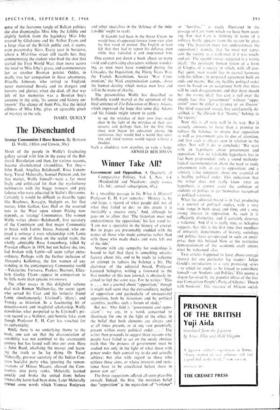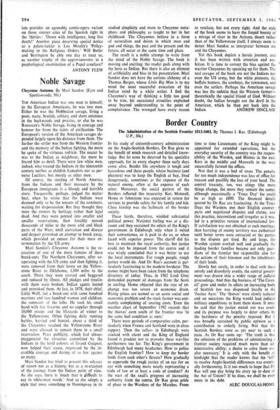Winner Take All?
Government and Opposition. A Quarterly of Comparative Politics. Vol. I, Nos. 1-4. (Weidenfeld and Nicolson: single issues, 13s. 6d.; annual subscription, 45s.) IN a revealing passage in his 1Vhat is History? Professor E. H. Carr remarks: 'History is, by and large, a record of what people did, not of what they failed to do: to this extent it is inevitably a success story.' And, although he goes on to allow that 'The historian must not underestimate the opposition,' his last word is: 'I am not a specialist in the history of cricket. But its pages are presumably studded with the names of those who made centuries rather than with those who made ducks and were left out of the side.'
Anyone with any sympathy for underdogs is bound to feel that there is something unsatis- factory about this, and to be ready to welcome an attempt to redress the balance a bit. The chairman of the editorial .. board, Professor Leonard Schapiro, writing a foreword to the first number of this new journal, is obviously in- clined to feel the same way. For he writes: 'This is . . . not a journal about "opposition," though it might well seem that the extraordinary neglect of opposition and particularly of unsuccessful opposition, both by historians and by political scientists, justifies such a forum of study.'
But no: 'Our field is "government and oppo- sition": we are, in a word, concerned to illuminate the one in the light of the other, in the belief that both elements are always and at all times present, or at any rate potentially present within every political order. . . .' The writer then proceeds to suggest three reasons why people have failed to act on the surely obvious truth that 'the process of government must be studied not only in the light of what those with power under their control try to do and actually achieve; but also with regard to those who achieve those aims, or whose interests and resis- tance have to be conciliated before those in power can act.'
The three suggestions offered all seem plausible enough. Indeed, the first, 'the mistaken belief that "opposition" is the equivalent of "violence"
or "hostility,— is nicely illustrated in the passage of Carr from which we have been quot- ing. For that Carr is thinking in terms of a military battle appears from the reason he gives why 'The historian must not underestimate the opposition': namely, that 'he must not repre- sent the victory as a walk-over if it %vas touch- and-go. The second source suggested is a wrong ideal: 'the persistent human vision of a form of Utopia, of a society in which, with all con- flict spent, man would live in eternal harmony with his fellows in perpetual agreement both on ends and means.' But any healthy political order must be based on an acceptance both that there will be such disagreements and that there should be: the w rung ideal 'has cast a veil over the simple fact that "government" without "oppo- sition" must be either a tyranny or an illusion.' The third suggested source, less satisfactorily de- scribed, is 'the illusion that "history" belongs to the victors.'
Now this is all very well in its way. But it scarcely amounts to more than a promise to redress the balance, to ensure that opposition as well as government gets its due of attention, and that each is always seen in relation to the other. Nor will it do to conclude: 'We start with an h pothesis about government and opposition.' For no falsifiable hypothesis has in fact been propounded: only a sound methodo- logical recommendation about the need to study government with an ec to opposition; and a salutary value judgment about one essential of a health political order. This indication that the writer doe, not really know what an hypothesis is cannot assist the ambition of students of politics to eel themsek es recognised as political .0e/taws.
What the editorial board is in fact producing is a journal of political studies, with a very wide range in both space and time, and a very strong interest in opposition. As such it is sufficiently distinctive, and it certainly deserves a welcome. And if it is really true, as Schapiro suggests, that this is the first time that menibers of university departments of history, sociology and politics have co-operated in such an enter- prise, then this belated blow at the restrictive demarcationism of the academic craft unions must be welcomed also.
Two articles happened to have above-average interest for one particular lay reader: Julius Gould's introduction to a very promising series --to which he ought to be forced to contribute himself—on 'Students and Politics.' This quotes a slogan favoured by the populist ultras of the for- mer Convention People's Party of Ghana: 'Down with bookism.' This treasure of African social- ism provides an agreeably comic-opera variant on those sinister cries of the Spanish right in the 'thirties: 'Down with intelligence, long live death!' Another piece deserving special notice as a palate-tickler is Leo Moulin's 'Policy- making in the Religious Orders.' Will Butler and Berrington be able one day to treat us, as another trophy of the aggiornamento, to a psephological examination of a Papal conclave?
ANTONY FLEW































 Previous page
Previous page